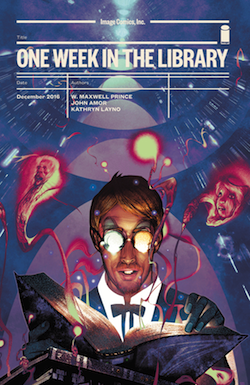Thursday Comics Hangover: A library full of empty books
One Week in the Library comes in a format that doesn’t get enough play in comics shops: a ten dollar “graphic novella” that tells a single story from beginning to end. It’s a great format — not quite long enough to be a full-sized graphic novel, but longer than your standard monthly comics issue. More cartoonists should work at this size; it’s a great length for the medium.

Unfortunately, One Week at the Library isn’t the best advertisement for the format. By which I mean it’s a bad book. Written by W. Maxwell Prince and illustrated by John Amor, Library is the story of a librarian who works, alone, in an imaginary library. (“…the SAD ENCYCLOPEDIAS are in the Happy Corridor, which also houses the MISERY CHRONICLES, which themselves are part of THE SERIES OF IMPOSSIBLE JOY.”) The book is divided into seven chapters — one for each day of the week — and each chapter employs a different formal technique: one chapter tells a story in diagrams, another is prose, another is wordless, and so on.
You’ve seen this before. Library feels kind of like a Sandman knockoff, a story about the power of stories. But unlike Sandman, the stories never really grow beyond their concepts. They’re stories about stories for the sake of stories, and they just sort of sit there on the page, all vapid flash and shallowness.
Toward the end of the book, Prince writes himself into the story and frets over whether the reader will think he’s smart. To which I reply: if you want a reader to think you’re smart, maybe don’t quote Doors lyrics in your story. And a book about the depth and breadth of libraries should feel as though it was written by someone who has explored those depths. The literary references in Library are facile (Charlotte’s Web and Lewis Carroll get repeated shout-outs) and the library conceit disappears entirely at various points.
The Prince character self-consciously acknowledges the many comics writers who have appeared in their own books in the past, including Grant Morrison, and he whines that “I’m suffering a ton of anxiety that someone reading this will think I’m being lazy or derivative.” Unfortunately, simply acknowledging a critical complaint in a story isn’t enough to disarm that complaint, and writing a book about books isn’t enough to inspire warm literary feelings in a reader. The books in this library feel strangely empty of value.